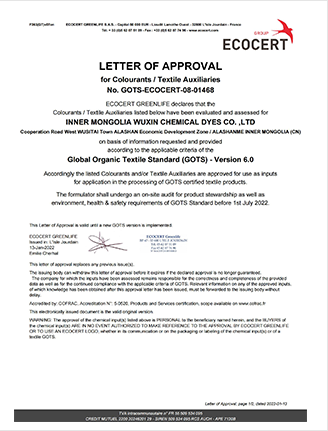indigo vat dye companies
The Indigo VAT Dye Industry A Comprehensive Overview
Indigo, one of the oldest dyes in the history of textile coloration, has seen a significant evolution in its usage and application over centuries. Traditionally derived from the indigo plant, today’s market features synthetic versions that cater to diverse industrial requirements. The emergence and growth of indigo VAT dye companies have transformed how this dye is produced and utilized, fostering innovation while ensuring sustainability and efficiency.
Understanding Indigo VAT Dyes
Indigo VAT dyes are a class of colorants that require a unique dyeing process to facilitate their application in textiles. Unlike direct dyes that adhere to fibers without alteration, indigo must be converted into a soluble leuco form before it can penetrate fabric. This reduction process typically involves a chemical reaction using reducing agents like sodium hydrosulfite in an alkaline environment. Once the dye has been absorbed by the textile, it undergoes oxidation in the air, reverting to its insoluble form and establishing a deep, rich color that is highly prized in the fashion and textile industries.
Applications of Indigo VAT Dyes
Indigo VAT dyes have found extensive applications beyond traditional denim. Although they are famously associated with blue jeans, these dyes are utilized in various textiles, including cotton, wool, and silk. The robust coloring of indigo makes it an ideal choice for creating washed-out effects, tie-dye patterns, and more intricate designs. Furthermore, the longevity and fade resistance of indigo applications provide an added advantage for manufacturers keen on producing high-quality, long-lasting fabrics.
The Role of Indigo VAT Dye Companies
Indigo VAT dye companies focus on the effective production and distribution of these chemical compositions, responding to market demands and regulatory frameworks. These companies invest heavily in research and development to improve dye formulations, enhancing their properties such as solubility, colorfastness, and environmental impact. Many leading companies strive to develop sustainable practices, particularly amidst increasing scrutiny concerning the environmental footprint of textile production.
For instance, several manufacturers are investing in processes that utilize renewable resources and reduce water and energy consumption during dye application. The quest for eco-friendliness has led to the adoption of plant-based alternatives in dyeing processes, alongside the manufacturing of synthetic indigo from less harmful chemicals.
indigo vat dye companies

Major Players in the Industry
The indigo dye market features several key players known for their innovative methods and quality products. Companies such as DSM Dyneema, Archroma, and Huntsman Textile Effects have established themselves as leaders in supplying high-performance indigo VAT dyes to the textile industry. These organizations prioritize sustainability by promoting eco-friendly practices through their production processes while also providing tailored solutions to meet the unique needs of their clients.
Moreover, the rise of smaller companies focusing on niche market segments further diversifies the industry. Such companies emphasize artisanal approaches and small-scale production, catering to designers and brands that value handcrafted textiles.
Challenges and Future Directions
While the industry shows promise, it faces challenges such as regulatory compliance and environmental concerns. The textile industry is subject to stringent laws regarding waste management and emissions, pushing indigo VAT dye companies to innovate continuously. The shift towards bio-based dyes and sustainable practices may pave the way for a more responsible indigo dyeing ecosystem.
As consumer preferences evolve towards sustainable fashion, indigo VAT dye companies must adapt by exploring new materials, processes, and technologies. The future will likely witness further advancements in dye chemistry, enabling more efficient and environmentally friendly dyeing processes.
Conclusion
Indigo VAT dye companies are pivotal in shaping the textile industry, balancing tradition with innovation. As they navigate contemporary challenges and consumer expectations, these companies are set to redefine their role and impact in a rapidly changing market. With a growing commitment to sustainability and creativity, the future of indigo dyeing looks bright, ensuring this historic dye remains relevant for generations to come.
-
Innovating Bromo Indigo Excellence
NewsAug.23,2025
-
Pioneering Indigo Plant Dye Excellence
NewsAug.23,2025
-
Leading Sulphur Black Dyes Enterprise
NewsAug.23,2025
-
Sulphur Black Dyes Light Resistance
NewsAug.23,2025
-
Indigo Blue Granular Industrial Uses
NewsAug.23,2025
-
Bromo Indigo Synthetic Production Process
NewsAug.23,2025
-
The Timeless Art of Denim Indigo Dye
NewsJul.01,2025

Sulphur Black
1.Name: sulphur black; Sulfur Black; Sulphur Black 1;
2.Structure formula:
3.Molecule formula: C6H4N2O5
4.CAS No.: 1326-82-5
5.HS code: 32041911
6.Product specification:Appearance:black phosphorus flakes; black liquid

Bromo Indigo; Vat Bromo-Indigo; C.I.Vat Blue 5
1.Name: Bromo indigo; Vat bromo-indigo; C.I.Vat blue 5;
2.Structure formula:
3.Molecule formula: C16H6Br4N2O2
4.CAS No.: 2475-31-2
5.HS code: 3204151000 6.Major usage and instruction: Be mainly used to dye cotton fabrics.

Indigo Blue Vat Blue
1.Name: indigo blue,vat blue 1,
2.Structure formula:
3.Molecule formula: C16H10N2O2
4.. CAS No.: 482-89-3
5.Molecule weight: 262.62
6.HS code: 3204151000
7.Major usage and instruction: Be mainly used to dye cotton fabrics.

